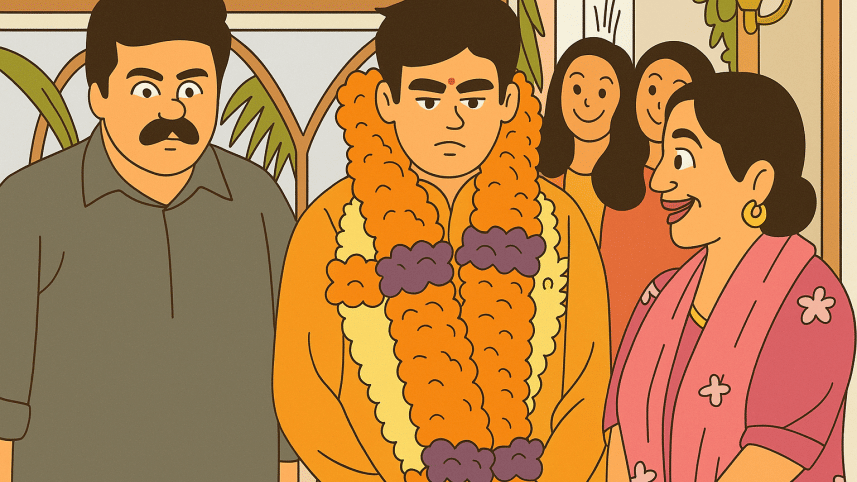What ‘ghor jamai’ really means in today’s society

In many cultures around the word, the norm after marriage dictates that the newly wedded wife moves in with the husband (and his family) and make his house her new home. But what happens when circumstances demand a reversal of this shift and the husband decides to move in with the wife's family?
For as long as memory serves, women have been glorified for leaving their families after marriage and coming to the husband's home to accept his family as hers. It is a heavy cross to bear but one that earns her the badge of being a "good" wife, and an "adjusting" woman.
Oddly, the same is not the case for a man who decides to live with his wife's family.
In fact, the term "ghor jamai" has been used as a derogatory label across the Indian subcontinent, often implying that the husband is "too soft" or that he lacks self-respect. As a result, the phenomenon is rarely discussed, much less accepted. For many, the idea of a man leaving his own family to be with his wife's simply means the husband values his own kin less or is too lovesick to stand up for his own familial bonds.
Despite the double standards, modern society is a convenience society. Back in the day, the concept of a nuclear family was perhaps just as frowned upon, but here we are. Younger couples with dynamic lifestyles prefer to tailor their lives according to what works for them and are happy to turn a deaf ear to what people have to say about it.
"I've moved in with my wife after marriage," shared Anwar Mutahar, a 36-year-old banker. "My house is small, and already has an unmarried sister living in it, along with my parents." Anwar mentioned that there was simply no room for him and his wife to be able to live there comfortably. "My mother-in-law is an ailing widow who needs my wife's support with most things," he added. "It just made sense to shift to my wife's home — we saw it as a win-win situation for everyone."
Many couples consider proximity to workplace, ailing/dependent parents and space issues to be adequate reasons to decide to reside in their wife's home.
"Both my husband and I work in Gulshan," stated Ruchi, a new bride of barely four months. "My husband used to commute all the way from Lalmatia and with the present traffic situation, this was a very stressful arrangement." She managed to convince her husband that living in Gulshan with her parents was a better solution to their problems. "I told him that it would save us at least a couple of hours in the day, not to mention fuel costs." Her husband saw the logic behind her words and was able to convince his parents. "My husband and I visit my parents-in-law over the weekend, sometimes even staying over for the two days."
Not everyone, however, is on board with this idea, finding it difficult to change the age-old mindset. "I am a girl-mom," declared Najma Kareem, a woman in her early 70s. "My mother left her home when she got married, and never claimed any other house but my father's as her own. Nor did I. And neither will my daughter."
Najma feels that if her son-in-law lives with her daughter and herself in their home, the groom's family may have misgivings with her, now or in the future. She also feels that her son-in-law may become dependent on her income in future, if he feels he is doing them a favour simply by allowing her daughter to stay with her.
While Najma has concrete reasons for her stance in this regard, most of the time, people above a certain age do not have any reasonable backing for their vehement refusal of such a setting — except, perhaps, that the husband retains no respect when residing in his wife's home. This volatile idea of respect, however, is renounced abjectly by younger couples who want to break out of this traditional thinking.
"I am my own person," said Anwar. "I have to earn my own respect; it is hardly something I can shove down society's throat simply by living in my own house." Anwar claims that his wife probably holds him in higher regard due to his decision to support her ailing mother, and his parents don't mind the arrangement, which is what ultimately matters.
It is fairly evident that the youth of today cares more about their own convenience and wellbeing than society's perception of them. As such, one can expect familial structures to be fluid and dynamic, and as long as both sets of parents are open-minded and practical, there is no doubt that the ghor-jamai is here — not just to stay, but to become at least as common as the conventional culture or the nuclear family culture.



 For all latest news, follow The Daily Star's Google News channel.
For all latest news, follow The Daily Star's Google News channel.
Comments